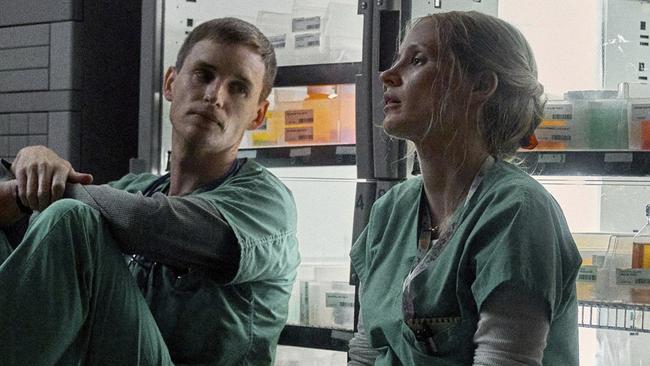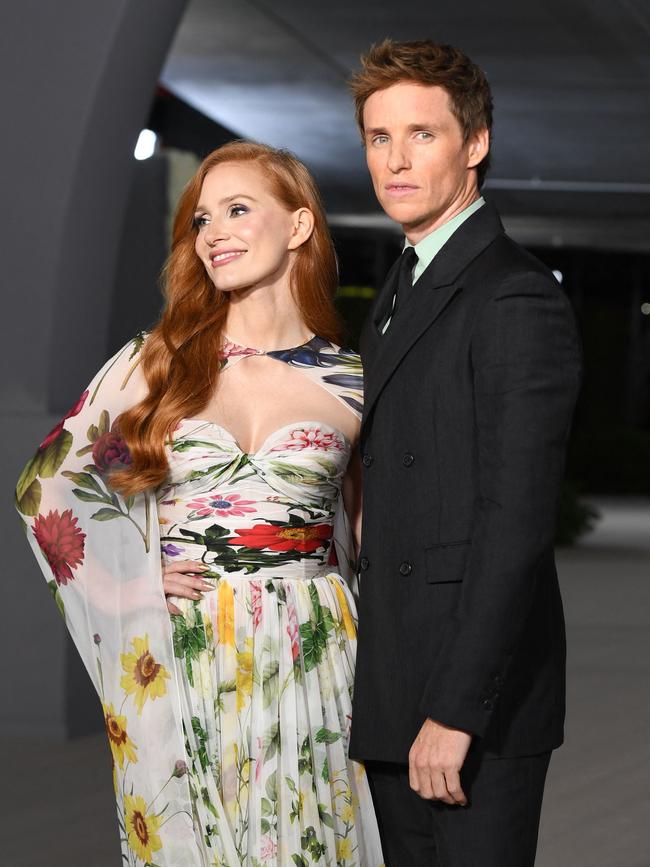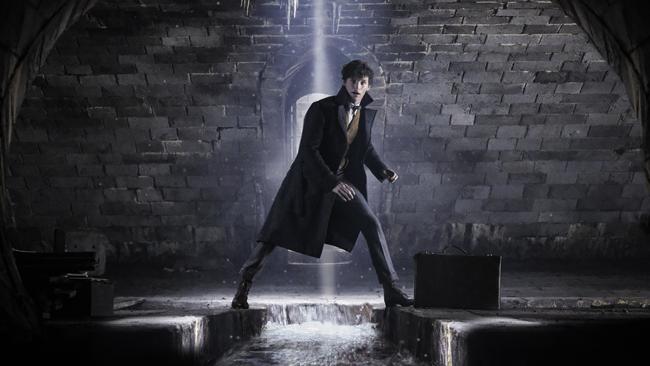Eddie Redmayne’s journey from Fantastic Beasts to The Good Nurse
For his latest role the Fantastic Beasts actor relished the chance to ditch the tweed suits and play against type as an American serial killer.

Six years ago, Eddie Redmayne put the word out. The Oscar-winning star of The Theory of Everything, who was already shooting the first instalment of the Fantastic Beasts franchise, let it be known he wanted a change. Yes, he had become famous for a certain kind of moral rectitude in lavish period dramas that included Birdsong, The Other Boleyn Girl and Les Miserables (his tearful rendition of Empty Chairs at Empty Tables from that film has been viewed 7.5 million times on YouTube), but enough was enough. “It was me actively saying that I’m looking for something different. Something not British. Something, ideally, where it’s not me wearing a tweed suit.”
It has taken a while, during which time he has completed two more Fantastic Beasts and enjoyed a last dip in the period trough (The Aeronauts), but Redmayne’s desires have finally been met. In The Good Nurse all bets are off. He is in full reinvention mode as American serial killer Charles Cullen, a nurse who from the 1980s may have murdered as many as 400 patients.
Redmayne, 40, stars opposite Jessica Chastain, playing Amy Loughren, the co-worker who helped bring Cullen to justice. And although Redmayne insists today the film tilts towards Loughren’s “hero’s journey”, the sexy marketing sell is clearly “Newt Scamander does Hannibal Lecter”.
And he does it well. His Cullen is top-tier Redmayne, a mass of creepy physical touches (a blinkless smile, an off-kilter stare) and conflicted gestures perfected over three months of deep-diving research. “I found as much footage of Charlie as I could and I learnt the accent, I learnt the movement, and then I even went to nurse school, where I found out that I’m a f..king useless nurse!” he says, chuckling at his inadequacies. Redmayne does this a lot. Good-natured self-deprecation. He is sipping decaf coffee in a swanky London hotel suite and wearing a crisp red-and-white “western-style” shirt that suggests a friendly yet slightly fragile cowboy. He peppers his conversation with asides about being not very good.

Of his movie career, he says: “The aspiration is always to make a great film and I don’t think I’ve made many of those.” Of his first big American outing, opposite Robert De Niro in The Good Shepherd, he says: “I was paranoid, I was disappointed and I did beige work.” And of his university days, doing theatre in Cambridge with fellow students Dan Stevens, Rebecca Hall and Tom Hiddleston, he says: “I remember seeing Tom in Arcadia and he was amazing. Rebecca was always extraordinary, and I remember Dan doing the Scottish play with extraordinary power too … the theatre that I did in Cambridge was utterly appalling.”
He does, however, allow himself a vague acknowledgment of accomplishment regarding his stellar turn in The Good Nurse, honed over the intense preparation period that has become his trademark since playing physicist Stephen Hawking in The Theory of Everything.
“Back then, James (Marsh, Theory’s director) basically said: ‘Eddie, to a certain extent this lives or dies based on your performance.’ So I said: ‘OK, if that’s the case, I need four months’ prep, I need a vocal coach, I need a movement coach and I need to do my research.’ And that process worked for me and taught me that, as an actor, I need a long, long runway.”
He talks some more about The Good Nurse and how it’s “not a documentary, but as close to the truth as you can get”. Of his unnerving performance, and his so-called radical shift away from period dramas and blockbusters, he says it’s not so much a reinvention as a return.
Most audiences, he says, imagine he emerged fully formed into the middle of Redmaynia (see the knockout trilogy of Les Miserables, The Theory of Everything and The Danish Girl). Whereas, in fact, he began as an intensely provocative character actor who burst on to the scene in 2007 playing, brilliantly, a neurotic pansexual murderer who sleeps with his mother in Savage Grace. He then moved on to become a drug-addicted pedophile in Hick. He started out, in short, as Edgy Redmayne. Then something happened: fame came calling, and the edges, perhaps, were rounded off. “My film career started in America, doing these tiny movies that nobody saw,” he says. “So it’s been kind of wonderful to get back to some sort of root, some instincts that thrilled me when I started,” he says. “And I do feel regalvanised by it.”
The real start, however, was as “one of around eight thousand workhouse boys in the Sam Mendes production of Oliver!”. Redmayne was 12 and living at home; his father was in corporate finance and his mother ran a relocation business. His childhood was “wonderful and loving”, and the Oliver! role launched him on a well-documented path from the Jackie Palmer Stage School (James Corden was a fellow student and ridiculed Redmayne about it on his American talk show) to school plays at Eton, then the belle epoque era of the Cambridge drama darlings Stevens, Hall and Hiddleston.
The path ended in 2005 with Redmayne, at the time behind the bar at the Builder’s Arms pub in Chelsea, flying to New York and banging down the doors of a production company there because he wanted to star in its small and incendiary movie about incest and murder (Savage Grace).
Yet the impact of Oliver!, he says, can’t be underestimated. “I was at school in London and I was allowed to leave during the middle of maths and take the Tube to Oxford Circus from Hammersmith, to the London Palladium, into the theatre and then around to the backstage of that theatre. The intoxicating romance of that was overwhelming. That was the drug.”
When fame hit, it landed with a wallop. He experienced Redmaynia as a sensory overload and something to integrate with his 2014 marriage to antiques dealer Hannah Bagshawe.
“The whole year of making The Theory of Everything was a blur because the stakes were so high and because I knew Stephen (Hawking) was going to see it. Then, when I was promoting the film, I was making The Danish Girl. And then, when I was making Fantastic Beasts, there was a day where I left the shoot, flew to LA, did press for The Danish Girl, walked the red carpet, got back on the plane and flew straight back into the Fantastic Beasts shoot. It is a period that is a hazy blur, and also because I was newly married, and then with young kids. It was an extraordinary time, but one that I still haven’t made much sense of.”
There are, nevertheless, memories of that period. On Les Miserables, for instance, he remembers asking director Tom Hooper if he could do multiple takes of that Empty Chairs number. “I did twenty-something takes, back to back.” And why? He laughs guiltily: “Because every day on that set you’d hear someone saying (drops voice to reverential whisper): ‘Oh, have you heard Hugh’s (Jackman) extraordinary rendition of Who Am I? And, oh, Annie’s (Hathaway) I Dreamed a Dream?’ But my one they kept pushing further down the schedule. So, by the time you get there, the pressure is immense. So I said: ‘Let’s give it as many times as we can!’.”
He remembers meeting Hawking outside a London screening room, where the physicist was about to be shown the movie of his life. “I was terrified, like, ‘Hi Steve, hope you enjoy the film, let me know what you think’. And he took about six minutes to type out his reply, and it said (does calm, unemotional voice): ‘I will let you know what I think. Good or otherwise’. And I remember thinking: ‘If it’s otherwise, I probably don’t need the details’.”
Then something curious happened. Just as Redmayne was at his most pre-eminent and professionally infallible (no wrong role, no bad performance), culture intervened. The vivid debates around identity politics looked unfavourably on Redmayne’s decision to play a pioneering transgender woman, Lili Elbe, in The Danish Girl. His failure-proof Fantastic Beasts franchise similarly took a kicking owing to the forthright views of its creator, JK Rowling, whose “women are women” stance was deemed unacceptable and appeared to have a real-world impact on the box-office performance of the series (each entry has underperformed, the most recent instalment, The Secrets of Dumbledore, being a near flop).
Redmayne reacted by announcing the Danish Girl debacle had been “a massive learning curve” and that, although he disagreed with Rowling’s stance on trans women (“Trans women are women, trans men are men and non-binary identities are valid,” he says), he felt the “vitriol” aimed at her on social media was “absolutely disgusting”. Today, he says, identity politics and issues of representation are foremost on his mind when a role is offered.
“It’s something that, with every job I do now and every job I take, I wrestle with. On the one hand, I believe that actors should be able to play anything and that freedom of artistic expression is important. On the other, I’m conscious that there are many marginalised communities that haven’t had a seat at the table, and until there is more even representation it feels wrong to be playing some of those parts.”

And Fantastic Beasts No.4? “That’s a very good question, and I don’t know the answer. It’s probably a question for (the series producer) David Heyman, JK Rowling and Warner Bros.”
He ends on the future, and on the work-life balance and spending as much time as possible with his children, Iris and Luke. “Actors are essentially circus performers,” he says. “And yet I had an upbringing that was very settled. And so trying to work out what’s best for our family is something that I question every day. It’s about not wanting my job, and my interests and my love for what I do to, like, damage my poor little ones.”
And his next role? “I don’t want to be the actor who says, ‘I can’t tell you about it’, but I can’t tell you about it.” But does that mean he is, right now, in the middle of his famous four months’ prep? Is he on the runway? His eyes light up. “Oh yes,” he says, beaming, a full diabolic smile from the reformed, regalvanised Edgy Redmayne. “Always.”
The Times
The Good Nurse is in theatres and on Netflix from next week.
